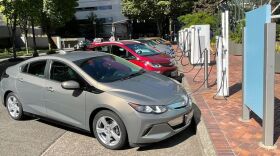-
A boom in data centers and the end of federal vehicle emissions standards means Oregon will fail to meet its 2035 greenhouse gas emissions reduction goal by two years, according to an analysis completed this month. But state officials pushing to drastically cut carbon emissions say it’s not too late to get back on track.
-
A massive heat wave is hitting the Pacific Ocean from Kamchatka to California.
-
January’s rains flooded farm fields and orchards. Many California farmworkers lost weeks of pay. Advocates say the state should help them weather such crises. A leading proposal would pay $300 a week to undocumented workers.
-
Eugene’s new ordinance banning natural gas hookups in new low-rise residential buildings would be put to a public vote, if organizers of a signature-gathering effort are successful.
-
Bills in Oregon and Washington seek to limit the industry’s ability to undermine clean air targets.
-
In Oregon, some utilities have begun ramping up renewable energy to meet the state's clean energy goals, but there’s a problem: The energy generated from these sources can only be used when the wind is blowing or the sun is shining.
-
The permits, also called Emergency Use permits, allow users like farmers and ranchers who don’t have groundwater rights to access that water during an emergency drought declaration when above-ground sources, like rivers and lakes, are too low.
-
Natural gas infrastructure will be banned in new low-rise residential buildings in Eugene.
-
Communities still have dry wells. Restoring groundwater takes decades, with costly, long-term replenishment projects — and ultimately, much less pumping.
-
An estimated 32 trillion gallons of water — in the form of rain and snow — came down on California in a series of nine back-to-back atmospheric rivers between late December and mid-January.
-
An investigation by the Public Utilities Commission found Oregon’s three natural gas utilities will not meet 2035 targets without urgent action.
-
Despite a federal deadline Tuesday, California — the largest user of Colorado River water — has refused to cut back as much as six other states proposed in a new plan today. Imperial Valley growers have the most to lose.
-
Oregon lawmakers are back in session, and climate advocates say passing laws on building efficiency and grabbing federal funding are critical this year.
-
Oregon ranked No. 2 in the nation, after California, for the share of new vehicles sold that are electric and with more fast chargers and federal tax credits on the way, sales are expected to increase.















